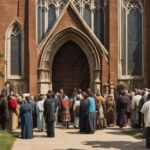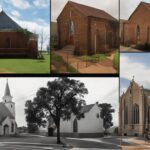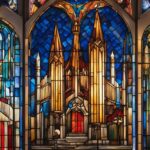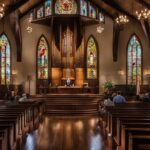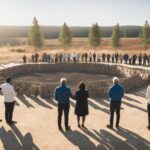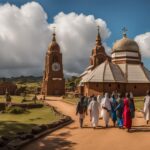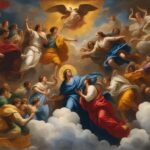The black church holds a special place in American history, serving as a center of strength, resilience, and cultural identity for the African American community. Its roots trace back to the arrival of enslaved Africans in the United States and their enduring faith throughout the oppressive institution of slavery. Despite the hardships they faced, black individuals and communities found solace and community within the church, shaping their beliefs, practices, and sense of identity.
The history of the black church is a testament to the triumph of the human spirit and the power of faith. From early plantation gatherings and secret religious meetings to the establishment of independent black churches, the black church became a driving force in the fight against racial injustice and a symbol of hope and empowerment for African Americans.
Today, historically black churches continue to play a vital role in the African American community, promoting social justice, providing support and guidance, and preserving cultural traditions. The black church stands as a testament to the enduring legacy of faith, resilience, and unity within the African American community.
Key Takeaways:
- The black church has a profound legacy in American history, serving as a source of strength and cultural identity for African Americans.
- Despite the oppressive conditions of slavery, black individuals and communities found solace and community within the church.
- The black church played a pivotal role in the fight against racial injustice and became a symbol of hope and empowerment for African Americans.
- Historically black churches continue to be vital institutions in the African American community, promoting social justice and preserving cultural traditions.
- The black church stands as a testament to the enduring legacy of faith, resilience, and unity within the African American community.
Origins of the Black Church
The black church has a rich history that can be traced back to the origins of African American Christianity and the merging of African spiritual traditions with the teachings of Christianity. The story begins with the arrival of African slaves in Jamestown in 1619, bringing with them their diverse African spiritual beliefs and practices.
In the early days of slavery, Anglican ministers attempted to teach Christianity to the slaves in the South, but it didn’t resonate with most of them. However, Methodist and Baptist preachers recognized the importance of converting the slaves and allowed some black individuals to become leaders and preachers within their congregations.
These early influences laid the foundation for the development of independent black churches, where African American Christians could worship freely and practice their own unique expressions of faith. The black church became a sanctuary and a refuge, providing a sense of belonging, community, and empowerment for the African American community.
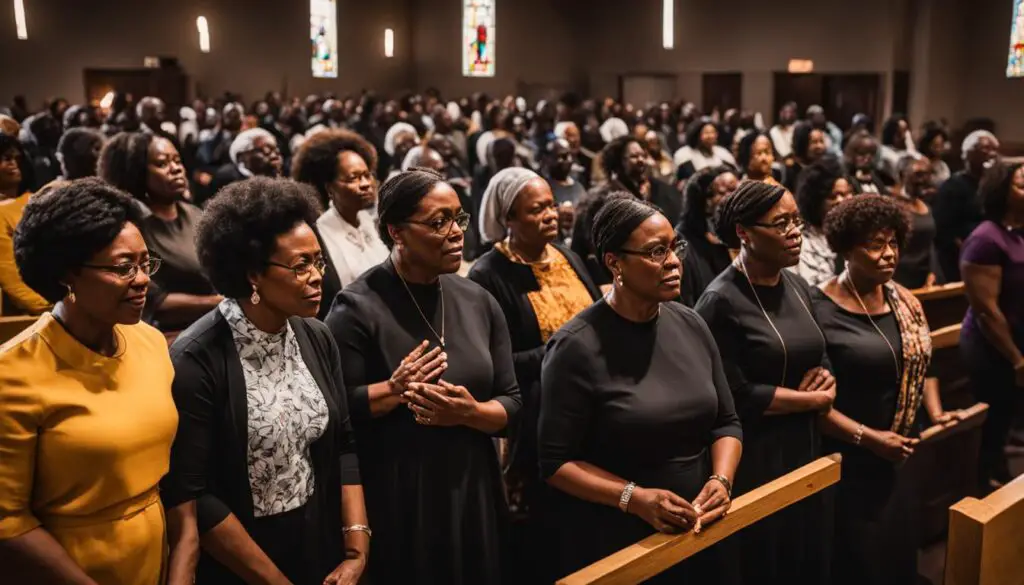
The merging of African spiritual traditions and Christianity within the black church created a distinct religious experience that reflects the resilience, strength, and cultural heritage of African Americans.
“The black church became a haven of spiritual embrace, a place where cultural traditions could coexist with Christian teachings.” – Michelle Beaulieu, African American Historian
The black church continues to evolve and adapt to the needs of the African American community today, playing a significant role not only in religious worship but also in social activism and community empowerment.
Beliefs and Doctrines of the Black Church
The black church encompasses a unique set of beliefs and doctrines that are deeply rooted in the experiences and aspirations of the African American community. These beliefs serve as a guiding force, shaping the spiritual, social, and cultural landscape of the black church. One of the central tenets of the black church is its emphasis on liberation theology, a theological framework that seeks to address social and political issues through the lens of Christian faith.
Liberation theology places a strong emphasis on social justice, equality, and empowerment. It recognizes that the struggles faced by the African American community are deeply intertwined with issues of systemic racism, poverty, and oppression. The black church, therefore, seeks to confront these challenges by promoting social change, advocating for equal rights, and uplifting marginalized voices.
“The black church is not just a religious institution; it is a beacon of hope, a catalyst for change, and a sanctuary for the oppressed. It is a place where our collective struggle for freedom and justice finds a spiritual home.”
The black church’s interpretation of scripture is also influenced by the black experience in America. It seeks to find meaning and relevance in biblical stories and teachings that resonate with the struggle for freedom and the pursuit of justice. Passages emphasizing liberation, equality, and the divine value of every individual hold particular significance within the black church.
Community and fellowship are fundamental aspects of the black church. It values the collective strength and resilience of the African American community, fostering a sense of unity and empowerment. The black church recognizes the importance of coming together, supporting one another, and uplifting each other through shared beliefs and experiences.
Finally, the black church places a profound trust in the power of prayer. It believes in the transformative and healing power of connecting with a higher power, seeking divine guidance, and finding solace in times of adversity. Prayer serves as a source of strength, hope, and spiritual renewal within the black church community.
Core Beliefs of the Black Church
- Emphasis on liberation theology and social justice
- Recognition of systemic racism and the fight against oppression
- Interpretation of scripture through the lens of the black experience
- Embrace of community and fellowship
- Belief in the power of prayer and spiritual renewal
| Beliefs and Doctrines | Description |
|---|---|
| Liberation Theology | An emphasis on addressing social and political issues through Christian faith, promoting social justice and equality. |
| Interpretation of Scripture | Examining biblical stories and teachings within the context of the African American struggle for freedom and justice. |
| Community and Fellowship | A recognition of the collective strength and resilience of the African American community, fostering unity and empowerment. |
| The Power of Prayer | A belief in the transformative and healing power of prayer, seeking divine guidance and finding solace. |
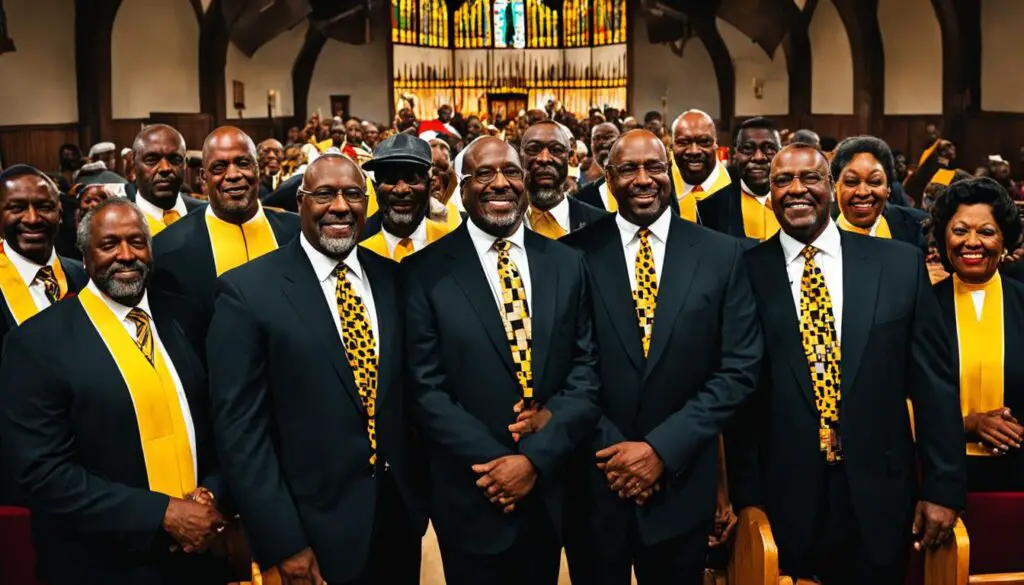
Sacraments and Rituals of the Black Church
Within the black church, sacraments and rituals play a significant role in the spiritual journey and communal experience of African American Christians. These practices, such as baptism and communion, hold deep symbolic meaning and are celebrated with joy and reverence.
One of the most important sacraments in the black church is baptism. Baptism represents a spiritual rebirth and a cleansing of sin, affirming the believer’s commitment to Jesus Christ. This sacred ritual is often performed in the presence of the congregation, symbolizing the community’s support and unity in faith. The act of baptism is a powerful declaration of faith and a stepping stone in the believer’s spiritual journey.
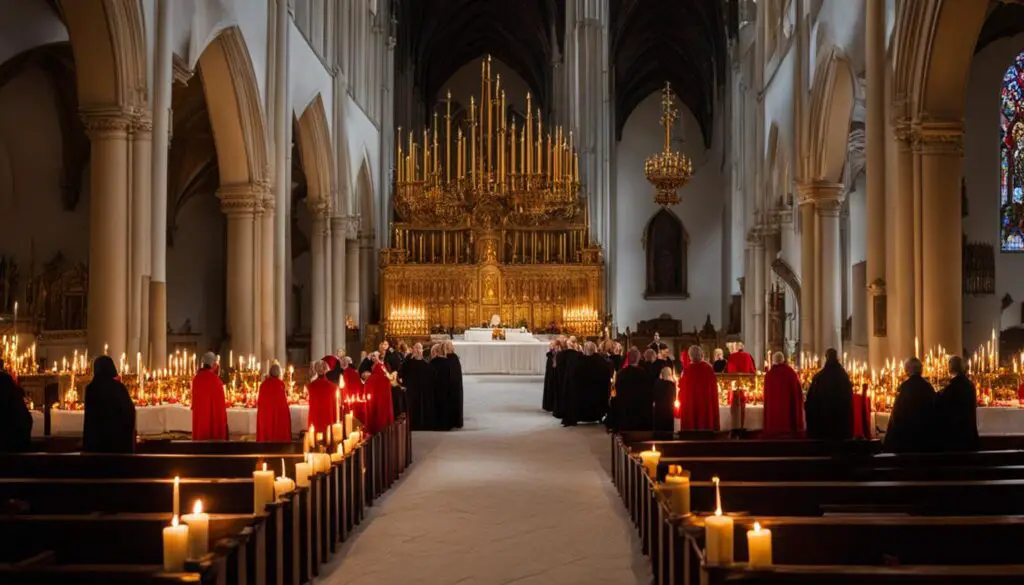
Communion, also known as the Lord’s Supper, is another integral part of the black church’s worship. During this ritual, believers partake in the sharing of bread and wine or grape juice, representing the body and blood of Christ. Communion symbolizes the unity of believers with Jesus and with one another as members of the body of Christ. It serves as a reminder of Christ’s sacrificial love and the believer’s participation in His redemptive work.
These sacraments and rituals are often accompanied by the richness of African American musical traditions. Gospel music fills the sanctuaries of the black church, infusing these sacred moments with soul-stirring melodies and heartfelt expressions of praise and worship. The power of song and communal singing creates a vibrant atmosphere of spiritual connection and celebration.
Rituals in the Black Church
Aside from the sacraments, the black church incorporates various other rituals that hold significant meaning for its congregation. These rituals may include anointing the sick, dedicating infants, and special ceremonies to honor milestone events in the lives of church members. These rituals provide comfort, spiritual guidance, and a sense of community throughout different stages of life.
“Sacraments and rituals in the black church are not merely empty traditions; they are profound expressions of faith, identity, and communal strength.”
| Ritual | Meaning |
|---|---|
| Baptism | Symbolic rebirth and commitment to Jesus Christ |
| Communion | Unity with Jesus and fellow believers in the body of Christ |
| Anointing the Sick | Prayerful healing and spiritual support for those facing illness |
| Child Dedication | Welcoming infants into the faith community |
| Milestone Ceremonies | Celebrating significant life events within the congregation |
Sacraments and rituals in the black church are not merely empty traditions; they are profound expressions of faith, identity, and communal strength. These practices connect the African American Christian community with their spiritual heritage and provide a transformative experience of worship and fellowship.
Leadership and Clergy in the Black Church
The black church has a rich tradition of black church leadership, with African American pastors and black clergy members playing a central role in guiding and shepherding the congregation. These pastors serve as spiritual leaders, community organizers, and advocates for social change.
Throughout history, African American pastors have been at the forefront of the fight for civil rights, using their pulpit to mobilize the African American community and challenge systemic racism. From Reverend Martin Luther King Jr., who led the Montgomery Bus Boycott and delivered the iconic “I Have a Dream” speech, to Reverend Jesse Jackson, a prominent civil rights activist and political leader, black pastors have used their platform to advocate for justice and equality.
Black pastors not only provide spiritual guidance and support to their congregations but also fulfill numerous roles within the community. They often act as mentors, counselors, and trusted advisors, offering guidance and assistance to individuals and families facing various challenges.
The black church highly values strong and visionary leadership. Pastors are expected to lead by example, demonstrating compassion, integrity, and a deep commitment to their congregants. They are responsible for bringing the Word of God to life, delivering insightful sermons that inspire and motivate the congregation.
Additionally, black pastors often play a crucial role in community organizing and facilitating grassroots initiatives. They actively engage in initiatives that address social and economic disparities, advocate for educational equity, and promote community development. Through their work, African American pastors contribute not only to the spiritual well-being of the community but also to its social, economic, and political empowerment.
Notable African American Pastors in History:
“We must be dedicated to the freedom and liberation of our people and to the peace and security of all humankind, just as we have shown great dedication in our efforts to free ourselves from the chains of segregation and discrimination.”
| Name | Denomination | Contributions |
|---|---|---|
| Reverend Martin Luther King Jr. | Southern Baptist Convention | Leader of the civil rights movement, advocate for nonviolent protest |
| Reverend Jesse Jackson | Rainbow PUSH Coalition | Political leader, civil rights activist, founder of the Rainbow PUSH Coalition |
| Reverend Joseph E. Lowery | African Methodist Episcopal Church | Civil rights leader, co-founder of the Southern Christian Leadership Conference |
| Reverend Gardner C. Taylor | American Baptist Churches USA | Pioneering preacher, influential homiletician |
The black church depends on the guidance, wisdom, and leadership of its clergy to navigate the challenges faced by the African American community. Through their dedication and tireless efforts, black pastors continue to make a significant impact, shaping not only the congregations they serve but also the broader society.
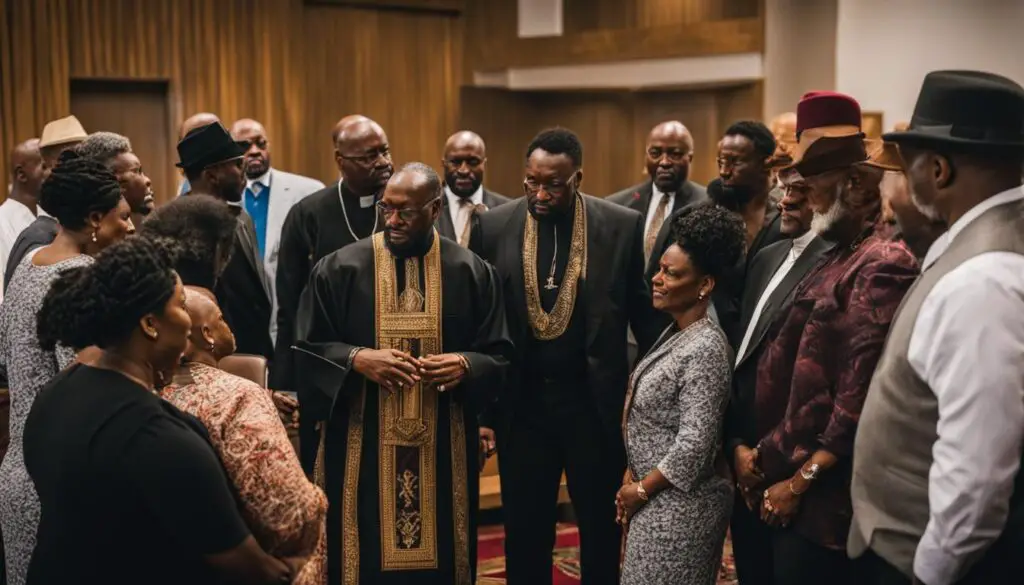
Worship Practices in the Black Church
In the black church, worship is a vibrant and lively experience that is deeply rooted in African American traditions. It is a time of celebration, spiritual connection, and unity within the congregation. Worship in the black church encompasses various elements that create a powerful and uplifting atmosphere.
Gospel Music: A Cornerstone of Worship
Gospel music holds a special place in the worship practices of the black church. With its soulful melodies and powerful lyrics, gospel music touches the hearts and souls of worshippers, inspiring them to connect with their faith on a deep, emotional level. Whether it’s the choir belting out uplifting hymns or a soloist delivering a passionate solo, gospel music sets the tone for worship in the black church.
Call and Response: Building Unity and Fellowship
Another central aspect of worship in the black church is the practice of call and response. This interactive form of worship involves the pastor or choir leader calling out a phrase, and the congregation responding in unison. This call and response pattern creates a sense of unity, fellowship, and active participation within the worship service. Worshippers engage in a rhythmic dialogue with the leader, expressing their devotion and connection to the message being delivered.
Passionate Singing and Energetic Dancing
Worship in the black church is not limited to sitting quietly in pews. It is a whole-body experience that often involves passionate singing and energetic dancing. The congregation actively expresses their emotions and praise through heartfelt singing, clapping, and dancing. This physical engagement with worship allows individuals to fully immerse themselves in the spiritual experience, celebrating their faith with joy and enthusiasm.
“Worship in the black church is a vibrant celebration of faith, where gospel music, call and response, and passionate singing come together to create a powerful and uplifting experience.”
Elements of Worship in the Black Church
| Element | Description |
|---|---|
| Gospel Music | Soulful melodies and powerful lyrics that inspire worshippers. |
| Call and Response | Interactive dialogue between the leader and the congregation, fostering unity and fellowship. |
| Passionate Singing | Emotional and enthusiastic vocal expressions of praise. |
| Energetic Dancing | Physical movements and gestures that reflect joy and devotion. |
Worship in the black church is a truly unique and transformative experience. It combines the power of gospel music, call and response, passionate singing, and energetic dancing to create a spiritual atmosphere filled with joy, unity, and connection to God.
Sacred Texts in the Black Church
The black church places a strong emphasis on the Bible as the sacred text and source of spiritual guidance. However, the black church also interprets scripture through the lens of the African American experience. It seeks to find meaning and relevance in the stories and teachings of the Bible that resonate with the struggle for liberation, justice, and equality. The black church values scripture as a source of strength, wisdom, and inspiration for the African American community.

In the black church, the Bible is viewed as more than just a religious text. It is a tool for empowerment and understanding, offering solace and hope in the face of adversity. African American interpretations of the Bible often focus on themes of liberation, drawing inspiration from stories of deliverance such as the Exodus and the teachings of Jesus advocating for justice and equality.
“We read the Bible through different lenses. Our African heritage gives us a unique perspective, and we see ourselves in the stories of struggle, triumph, and perseverance.” – Reverend James Daniels
The black church recognizes the significance of the Bible in shaping African American history and identity. It serves as a guiding light in navigating the challenges faced by the community, providing wisdom and guidance for both personal and collective journeys. The scriptures are studied, preached, and celebrated within the black church, fostering a sense of unity and shared purpose.
African American Interpretations of the Bible
| Key Themes in African American Interpretations | Relevant Scriptures |
|---|---|
| Freedom and Liberation | Exodus 3:7-10, Isaiah 61:1-4 |
| Hope and Resilience | Romans 5:3-5, Jeremiah 29:11 |
| Justice and Equality | Isaiah 1:17, Luke 4:18-19 |
| Community and Unity | Acts 2:42-47, Ephesians 4:1-6 |
The table above showcases some key themes in African American interpretations of the Bible and the relevant scriptures that support these interpretations. Through these interpretations, the black church finds inspiration, guidance, and a sense of spiritual connection to the struggles and triumphs of African American history.
Denominations and Sects of the Black Church
The black church comprises a diverse array of denominations and sects that serve the African American community with tailored spiritual guidance and support. Some of the prominent black church denominations include the African Methodist Episcopal (AME) Church, the Church of God in Christ (COGIC), and the National Baptist Convention.
The African Methodist Episcopal (AME) Church, founded by Richard Allen in 1816, holds a rich history within the black church tradition. It is the oldest independent Protestant denomination founded by African Americans. The AME Church emphasizes social justice, education, and the empowerment of the African American community.
The Church of God in Christ (COGIC), established in 1907 by Charles Harrison Mason, is one of the largest Pentecostal denominations in the United States. Known for its vibrant worship practices and emphasis on spiritual gifts, COGIC plays a crucial role in the African American religious landscape. It emphasizes holiness, divine healing, and the power of the Holy Spirit.
The National Baptist Convention, started in 1886, comprises various Baptist churches across the United States. With a focus on evangelism, community engagement, and leadership development, the National Baptist Convention has played a significant role in promoting social justice and civil rights within the African American community.
African Methodist Episcopal (AME) Church
The African Methodist Episcopal (AME) Church is deeply rooted in the black church tradition. It stands as a beacon of hope, highlighting the importance of social justice, education, and empowerment within the African American community. With a commitment to biblical teachings and community development, the AME Church has made significant contributions to the civil rights movement and continues to be a source of spiritual guidance and support for African Americans.
Church of God in Christ (COGIC)
With its dynamic worship practices and emphasis on spiritual gifts, the Church of God in Christ (COGIC) has a strong presence in the black church community. COGIC values holiness, divine healing, and the transformative power of the Holy Spirit. Through its ministries and outreach efforts, COGIC seeks to uplift individuals and communities, fostering spiritual growth and promoting social change.
National Baptist Convention
The National Baptist Convention, one of the largest African American religious organizations, comprises Baptist churches dedicated to evangelism, community engagement, and social justice. Deeply committed to the teachings of Jesus Christ, the National Baptist Convention addresses the spiritual needs of the African American community while advocating for equality, justice, and the eradication of systemic oppression.
| Denomination | Year Founded | Distinctive Features |
|---|---|---|
| African Methodist Episcopal (AME) Church | 1816 | Social justice, education, empowerment |
| Church of God in Christ (COGIC) | 1907 | Pentecostal worship, spiritual gifts, holiness |
| National Baptist Convention | 1886 | Evangelism, community engagement, civil rights |
Community and Outreach in the Black Church
The black church has always been deeply connected to the African American community, serving as a pillar of support and empowerment. Through community development and social outreach initiatives, black churches actively engage with and uplift the African American community. These efforts play a significant role in addressing the needs of community members and fostering a sense of belonging.
One of the key ways in which black churches contribute to the community is through the implementation of social programs. These programs aim to address prevalent issues such as poverty, food insecurity, and access to education. Black churches often establish food banks, distributing essential supplies to those in need. They also offer housing assistance programs, supporting individuals and families facing housing instability. Furthermore, educational programs organized by black churches provide academic support and guidance, empowering youth and adults alike.
In addition to these programs, black churches engage in community organizing to promote positive change. They serve as a hub for grassroots movements, advocating for social justice and equality. The black church frequently partners with local organizations and community leaders to address systemic issues and transform the lives of community members. This collaborative approach highlights the black church’s commitment to creating lasting change and improving the overall well-being of the African American community.
Transforming Lives through Outreach
The outreach efforts of black churches extend far beyond their physical spaces. These initiatives have a lasting impact on individuals and families, providing them with the resources and support they need to thrive. By focusing on community development and social welfare, black churches strengthen the African American community as a whole.
“The black church is a catalyst for change, empowering individuals and communities through its outreach initiatives. It provides hope, support, and a sense of belonging for those who need it most.” – Reverend Marcus Johnson
The dedication of black churches to community and outreach is deeply rooted in their commitment to the teachings of Christ and the values of love, compassion, and justice. By embodying these principles, black churches inspire individuals to make a positive difference in their lives and the lives of others.
Empowering the African American Community
Through its community engagement efforts, the black church empowers the African American community to overcome challenges and achieve personal and collective growth. By fostering a sense of belonging and support, black churches create spaces where individuals can find strength, encouragement, and opportunities for personal development.
Furthermore, the black church provides a platform for community members to develop their leadership skills, equipping them to drive positive change in their neighborhoods and beyond. The clergy and leaders within the black church are instrumental in nurturing and guiding individuals, encouraging them to become agents of transformation within their communities.
Ultimately, the community and outreach initiatives of black churches reflect their unwavering commitment to social justice and the overall well-being of the African American community. Through their efforts, black churches serve as beacons of hope, advocating for positive change and empowering individuals to create a brighter future.
Architectural and Artistic Features of the Black Church
The black church boasts a rich architectural and artistic tradition that blends African and European influences, creating unique and iconic structures within African American communities. From traditional wooden buildings to grand stone edifices, these churches are not only places of worship but also symbols of resilience and identity.
One striking feature of black church architecture is the intricate stained glass windows that adorn their interiors. These windows tell stories, depict biblical scenes, and showcase the craftsmanship of African American artists. The vibrant colors and mesmerizing designs of the stained glass windows create a serene and uplifting atmosphere, inviting worshippers to contemplate and seek solace in their faith.
Black church buildings are often characterized by their distinct architectural styles. The use of materials such as wood, stone, and brick lends a sense of authenticity and permanence to these structures. From the humble simplicity of rural churches to the grandeur of urban cathedrals, each black church building reflects the distinct history and cultural heritage of the African American community.
Inside black churches, significant attention is given to artistic elements that enhance the worship experience. Alongside stained glass windows, paintings, sculptures, and other decorative elements offer visual representations of biblical stories and African American religious experiences. These artistic expressions not only serve as visual aids for worship but also contribute to the overall ambiance of devotion and spirituality.
| Architectural and Artistic Features of the Black Church |
|---|
Many black churches have become iconic landmarks within their communities, embodying the spirit of African American resilience and faith. Their architectural and artistic features serve as a visual testament to the rich heritage and cultural legacy of the black church in America.
Contemporary Issues and Challenges Facing the Black Church
The black church, like many religious institutions, confronts contemporary issues and challenges in today’s society. These challenges include generational shifts, declining attendance, and a changing religious landscape. However, the black church also embraces emerging opportunities to address social justice issues and align with social justice movements.
The black church grapples with generational shifts, as younger generations seek their own paths and question traditional religious practices. The rise of secularism and the diversification of religious beliefs present challenges to the black church’s role in shaping African American religious identity.
Additionally, declining attendance poses challenges for the black church, as increased secularization and competing leisure activities draw people away from regular worship. The black church must find innovative ways to engage the younger generations and make worship experiences more relevant and meaningful.
In recent years, there has been a growing emphasis on addressing social justice issues within the black church. The church has become a platform for advocacy and activism, aligning with social justice movements such as Black Lives Matter. By embracing these movements, the black church strives to address systemic racism, inequality, and other social issues affecting the African American community.
The challenges facing the black church require continual adaptation and evolution. To overcome these challenges, the black church must engage with younger generations, foster a sense of African American religious identity, and actively participate in social justice movements. By doing so, the black church can continue to play a vital role in the lives of African Americans and create positive change in society.
Conclusion
The black church has a rich and profound legacy that has left an indelible mark on American history. It has served as a beacon of hope, community, and empowerment for the African American community throughout the centuries. With its roots in the struggles of slavery, the black church has provided a source of strength and resilience in the face of adversity.
From its origins in African spiritual traditions to its fusion with Christianity, the black church has developed unique beliefs and doctrines that reflect the experiences and aspirations of the African American community. It has consistently emphasized social justice, equality, and liberation, interpreting scripture in ways that resonate with the struggle for freedom.
The black church’s rituals and sacraments hold deep spiritual significance for believers. Baptism symbolizes rebirth and the cleansing of the soul, while communion represents the sharing of Christ’s sacrifice. These rituals, often accompanied by vibrant worship practices and gospel music, create a sense of unity and fellowship within the black church community.
The black church’s leadership and clergy have played a pivotal role in guiding the congregation and advocating for social change. Pastors have been at the forefront of the fight for civil rights, mobilizing the community and providing spiritual leadership. Their guidance has been instrumental in fostering a sense of identity and empowerment within the African American community.
Furthermore, the black church has been a bastion of community and outreach. It has provided social programs, educational initiatives, and support networks for its members. The black church has actively engaged with the African American community, addressing their needs and working towards social and economic justice.
The architectural and artistic features of the black church are a testament to its cultural significance. Black churches have become iconic landmarks in African American communities, reflecting a blend of African and European architectural influences. The interior art, such as stained glass windows and decorative elements, enhances the worship experience and adds to the unique atmosphere of the black church.
As the black church faces contemporary challenges, such as generational shifts and changing religious landscapes, it continues to adapt and evolve. Social justice movements and the pursuit of equality remain at the core of the black church’s mission. Its enduring legacy as a source of strength, resilience, and community will continue to shape the cultural landscape of the United States for generations to come.
FAQ
What is the history of the black church?
The history of the black church dates back to the arrival of enslaved Africans in the United States. Despite the oppressive conditions, black individuals and communities found strength, resilience, and a sense of identity within the church. The black church played a vital role in shaping the African American community and resisting racial injustice.
How did the black church originate?
The black church originated from the merging of African spiritual traditions and the teachings of Christianity. Slaves brought their African spiritual practices with them, and Methodist and Baptist preachers made efforts to convert them. These early influences laid the foundation for the development of independent black churches.
What are the beliefs and doctrines of the black church?
The black church emphasizes liberation theology and places a strong emphasis on social justice, equality, and empowerment. It interprets scripture in ways that resonate with the struggle for freedom and justice. The black church values community, spirituality, and the power of prayer in overcoming adversity.
What sacraments and rituals are practiced in the black church?
The black church practices sacraments such as baptism and communion. Baptism symbolizes spiritual rebirth and the washing away of sin, while communion represents the sharing of the body and blood of Christ. These rituals are often accompanied by music, singing, and a sense of celebration within the black church community.
Who are the leaders in the black church?
African American pastors play a central role in the black church as spiritual leaders, community organizers, and advocates for social change. They have historically been instrumental in the fight for civil rights and played a key role in mobilizing the African American community. The black church values strong leadership and relies on the guidance of its clergy.
What are the worship practices in the black church?
Worship in the black church is vibrant, lively, and deeply rooted in African American traditions. It includes lively music, passionate singing, and energetic dancing. Gospel music is a cornerstone of worship, and the congregation actively participates through call and response, creating a sense of unity and fellowship.
What sacred texts are valued in the black church?
The black church values the Bible as the sacred text and source of spiritual guidance. However, it also interprets scripture through the lens of the African American experience, finding meaning and relevance in stories and teachings that resonate with the struggle for liberation, justice, and equality.
What denominations make up the black church?
The black church encompasses a variety of denominations and sects that cater specifically to the African American community. Some prominent denominations include the African Methodist Episcopal (AME) Church, the Church of God in Christ (COGIC), and the National Baptist Convention.
How does the black church engage in community and outreach?
The black church plays a significant role in community development and social outreach, including providing social programs such as food banks, housing assistance, educational programs, and community organizing. It serves as a hub for the community, providing a sense of belonging, support, and empowerment for its members.
What architectural and artistic features are seen in the black church?
The black church has a rich architectural and artistic tradition. Many black churches feature unique styles that reflect both African and European influences. From traditional wooden structures to grand stone buildings, black churches often serve as iconic landmarks in African American communities.
What contemporary issues and challenges does the black church face?
The black church grapples with generational shifts, declining attendance, and the changing religious landscape. There is also a growing emphasis on addressing social justice issues and aligning with social justice movements such as Black Lives Matter. The black church is constantly adapting to address the needs of the African American community in the modern world.
What is the significance of the black church?
The black church has an enduring and significant legacy in American history. It has served as a source of strength, resilience, and community for the African American community, providing a spiritual, social, and cultural foundation. The black church continues to play a vital role in addressing the needs of the African American community and promoting social justice.

